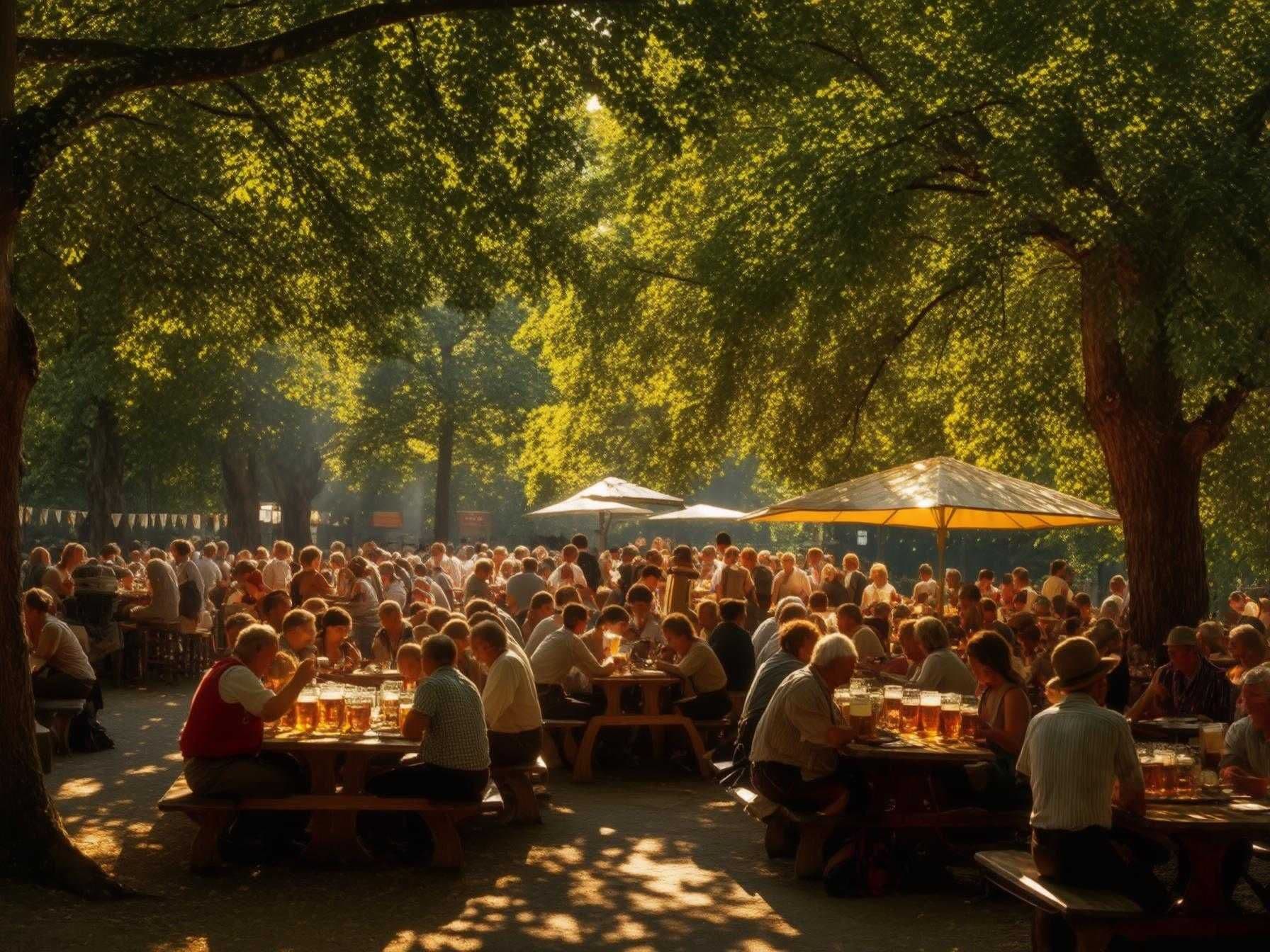
"Munich’s Beer Gardens: A Local’s Ultimate Guide"
"Munich’s Beer Gardens: A Local’s Ultimate Guide"
Your AI Travel Agent guide to Munich's iconic beer gardens: unwind in historic outdoor venues, savor authentic Bavarian brews, and experience local culture. From Hofbräuhaus to hidden gems, find budget-friendly spots perfect for both casual visits and special occasions.
The Fascinating History of Munich Beer Gardens
Munich’s beer gardens trace back to 19th-century Bavaria, rooted in necessity but evolving into iconic social spots. Originally, brewers were restricted from brewing during the warm summer months due to limited refrigeration. Depositing beer in cool cellars beneath chestnut trees, they began serving it outdoors, transcending the mere act of drinking into a communal social activity. Features like shared long tables encouraged conversation and community-building, hallmark traits that continue to this day.
Today, these beer gardens represent the heart of Bavarian culture, thriving amid Munich’s urban landscape. Whether found in scenic parks or bustling neighborhoods, these gardens continue to embrace their historic roots while welcoming visitors from around the world to experience a unique blend of tradition and sociability.
What Makes Munich's Beer Gardens Stand Out?
In Munich, beer gardens present a quintessential Bavarian ambiance, unlike any typical pub or bar. The traditional aesthetic is amplified by communal seating, with long wooden tables that encourage connections among diverse groups, often uniting strangers in spontaneous camaraderie. This setting makes Munich beer gardens perfect for mingling over Germany’s classic brews.
Munich's revered breweries offer a spectrum of beers, from smooth lagers like Augustiner to robust brews such as Hofbräu, ensuring a satisfying taste for every visitor. Accompanying these drinks are delicious Bavarian dishes, including pretzels, spicy Obatzda, and succulent grilled sausages, enhancing the beer garden experience.
Nestled among lush chestnut trees or in picturesque park settings, Munich's beer gardens offer more than just quality food and drink—they provide a relaxed, al fresco escape that differentiates them from indoor pubs, making them a cherished aspect of the Munich experience.
Top 7 Must-Visit Beer Gardens in Munich
Hofbräuhaus Beer Garden
The Hofbräuhaus, originating as a 16th-century pub, now boasts an adjacent beer garden that extends its legendary allure. Located near Munich’s Old Town, it balances the hustle of city life with an inviting outdoor ambiance. Classic beers like Hofbräu Original or Dunkel delight alongside iconic Bavarian favorites such as roast pork with dumplings. Here, traditional Bavarian music enhances the lively vibe, making it a staple on anyone’s journey to Munich, Germany.
Augustiner-Keller
Situated in central Munich, Augustiner-Keller is celebrated as the city’s oldest beer garden. Rich with authentic Bavarian charm and historic architecture dating back to the 1800s, it offers a family-friendly atmosphere where guests can enjoy meals beneath chestnut trees. Sampling Augustiner beer here, crafted according to age-old recipes, offers a genuine taste of Munich's brewing heritage.
Chinesischer Turm
Located within the expansive English Garden, the Chinesischer Turm beer garden provides a beautiful setting. Its pagoda-like tower serves as a picturesque backdrop as visitors savor Helles or Weissbier accompanied by live Bavarian music. The vibrant yet relaxed environment is ideal for those seeking a day of nature, culture, and excellent beer, complete with walking trails and picnic spots.
Seehaus Beer Garden
The Seehaus, also in the English Garden, offers a more refined beer garden experience alongside serene lakeside views. Perfect for enjoying seasonal dishes like grilled fish or asparagus, Seehaus' menu varies, celebrating fresh, local ingredients. The tranquil atmosphere and attentive service make it a haven for those seeking relaxation away from the city’s bustle.
Hirschgarten
Munich’s largest beer garden, Hirschgarten, offers seating for thousands beneath chestnut trees. Highlighted by free-roaming deer in the neighboring park, this venue provides a bucolic escape within city limits. Visitors can savor traditional Bavarian dishes or bring their own picnic baskets to complement the beer, making Hirschgarten a perfect spot for leisurely outings or family gatherings.
Löwenbräukeller
Löwenbräukeller promises a regal beer garden experience, connected to one of Munich’s most historic breweries. Known for hosting traditional events and festivals, it offers celebrated Löwenbräu beers and Bavarian specialties like Spätzle and Sauerbraten. Its lively atmosphere and welcoming vibe make it popular among both locals and tourists.
Westpark Beer Garden
For those interested in lesser-known gems, the Westpark Beer Garden in Munich, Germany, is a hidden treasure. With a relaxed atmosphere and occasional craft beer selections reflecting modern brewing trends, it blends traditional charm with exciting new flavors—perfect for those exploring beyond the typical tourist path.
Insider Tips for Enjoying Munich's Beer Gardens
For the best experience, visit on weekday afternoons or early evenings to avoid crowds. On weekends, particularly sunny ones, these beer gardens become lively with tables often packed.
Here are some pro tips for your Munich, Germany travel: Be ready with a cheerful Prost! before enjoying your beer. Munich is also best enjoyed with some local language skills; having a few basic German phrases at hand can enhance interactions with waitstaff. Ordinarily, beer comes in one-liter mugs called Maß, and it is customary to tip 5-10%.
Reserving a seat with a personal belonging while you order is common practice. Large groups sharing tables is part of the culture, so expect to make new friends. While you can bring your own snacks, purchasing food and drink onsite supports the venue and keeps the experience authentic.
Pairing Bavarian Food and Beer: What to Try
In Bavarian culture, food and beer are inseparable. Classic giant pretzels go perfectly with a crisp lager. Obatzda, a cheese spread, pairs wonderfully with wheat beer.
Weisswurst, eaten with sweet mustard, contrasts the hoppy bitterness of beer, while pork knuckle’s crispy skin complements richer brews. Schnitzel and various wursts round out a menu celebrating bold flavors. Seasonal specialties like grilled asparagus or fresh fish add delightful flavors aligned with European seasons.
Additional Activities Near Munich's Beer Gardens
After indulging in food and drink, the English Garden near the Chinesischer Turm offers walking paths and paddle-boats for further exploration.
Close to Augustiner-Keller, vibrant markets and shops offer souvenirs, fresh produce, and artisan goods for a leisurely post-beer visit. Hofbräuhaus’s proximity to Munich’s Old Town allows for sightseeing at landmarks like Marienplatz and the Frauenkirche, enriching the culinary adventure with historic exploration.
Conclusion
Beyond eating and drinking, Munich’s beer gardens capture the Bavarian spirit, hospitality, and history, offering travelers an immersive experience. With communal seating that encourages interaction and vibrant atmospheres, beer gardens offer a genuine glimpse into Munich’s soul.
Whether enjoying centuries-old chestnut trees or savoring local brews, visiting Munich's beer gardens creates memorable experiences, steeped in culture and camaraderie. Embrace the Bavarian way with open arms on your next trip to Munich, Germany, promising lifelong memories.
Frequently Asked Questions
Best time to visit Munich
The best time to visit Munich largely depends on your interests and what kind of activities you wish to enjoy. Here's a breakdown of the seasons to help you decide:
Spring (March to May)
- Spring in Munich sees mild weather, making it a pleasant time for sightseeing and enjoying the blooming parks and gardens.
- Events like Frühlingsfest, a spring festival similar to Oktoberfest, take place during this time.
Summer (June to August)
- This is peak tourist season, with warm temperatures ideal for outdoor activities.
- You can enjoy beer gardens and numerous cultural festivals, but be prepared for larger crowds.
Fall (September to November)
- September is famous for Oktoberfest, an iconic beer festival drawing visitors from around the world.
- Early fall offers comfortable temperatures and is perfect for exploring the city and its scenic surroundings.
Winter (December to February)
Top attractions in Munich?
Munich, the capital of Bavaria, is known for its rich history, cultural heritage, and vibrant atmosphere. Here are some of the must-visit attractions in Munich:
Marienplatz
Marienplatz is the central square in Munich and a hub of activity. It is home to the New Town Hall and the famous Glockenspiel.
Englischer Garten
One of the largest urban parks in the world, the Englischer Garten is perfect for a leisurely stroll, a picnic, or a visit to a traditional beer garden.
Nymphenburg Palace
This beautiful Baroque palace offers stunning architecture and expansive gardens, making it a favorite for history and art enthusiasts.
Deutsches Museum
The Deutsches Museum is one of the world's largest museums dedicated to science and technology
Safety tips for travel in Munich?
Munich is generally a safe city for travelers, but it's always wise to take precautions to ensure your safety. Here are some tips to help you stay safe during your visit:
General Safety Tips
- Keep your belongings close and secure, especially in crowded areas like public transportation and tourist attractions.
- Be aware of pickpockets and avoid carrying large sums of cash.
- Stay alert and trust your instincts; if something feels off, remove yourself from the situation.
